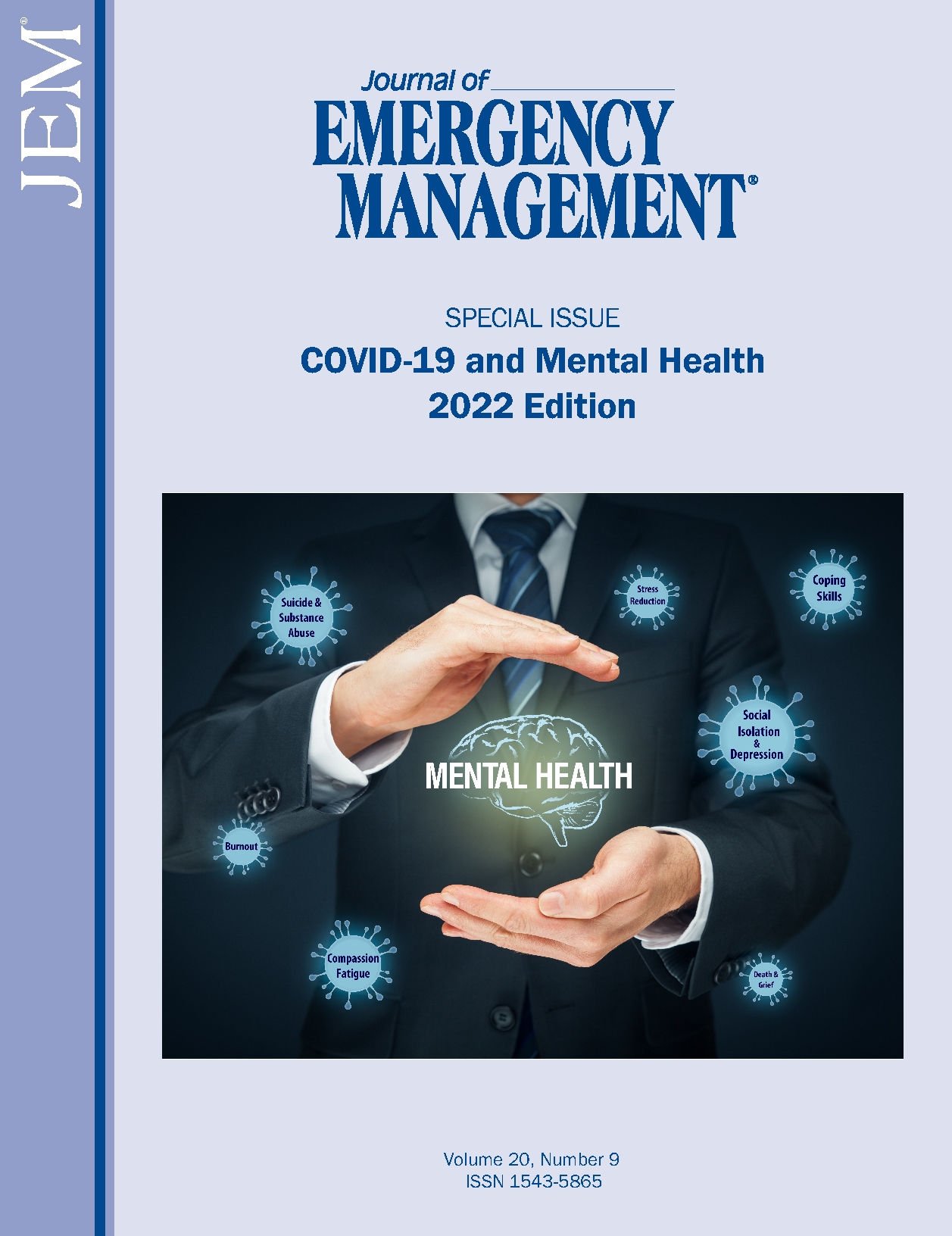Status and view toward COVID-19 and mental health among vulnerable group: A cross-sectional rapid survey among rickshaw pullers of Bangladesh
DOI:
https://doi.org/10.5055/jem.0691Keywords:
COVID-19, informal settlement, Dhaka city, rickshaw pullers, vaccinationAbstract
Bangladesh has experienced the hardest coronavirus disease 2019 (COVID-19) impact on the socioeconomic sector. The underprivileged group, rickshaw pullers, faced extreme situations due to the pandemic. This rapid cross-sectional study was conducted among 190 rickshaw pullers of Dhaka city. Knowledge, attitude, and practice (KAP) survey was carried out to evaluate their view and COVID-19 response level. Descriptive statistics were calculated. Statistical analyses such as Kruskal–Wallis or Mann–Whitney U tests, Spearman’s rank correlation, the linear regression model, Chi-square test, and Fisher’s exact test were performed where appropriate. The majority of them rated the high impact of COVID-19 on their income and mental health. Age, living with family, accommodation type, income, and COVID-19 infection history were found as associating factors with these impacts. A large number of the study population demonstrated low knowledge level (42.63 percent), moderate attitude level (57.37 percent), and moderate practice level (58.95 percent) toward COVID-19 and the vaccination. Positive attitude could reduce their mental health concern due to the pandemic. The study population mostly used their surrounding people as the main source of COVID-19 information. However, digital media have played a crucial role to disseminate authentic information. Ensuring better socioeconomic conditions can help these highly vulnerable people to be effectively prepared and respond against the pandemic.
References
Hua J, Shaw R: Corona virus (COVID-19) “infodemic” and emerging issues through a data lens: The case of China. Int J Environ Res Public Health. 2020; 17(7): 2309. DOI:10.3390/ijerph17072309.
WHO: 2020. Available at https://www.who.int/emergencies/diseases/novel-coronavirus-2019/situation-reports. Accessed June 13, 2020.
Zhong B-L, Luo W, Li H-M, et al.: Knowledge, attitudes, and practices towards COVID-19 among Chinese residents during the rapid rise period of the COVID-19 outbreak: A quick online cross-sectional survey. Int J Biol Sci. 2020; 16(10): 1745-1752. DOI:10.7150/ijbs.45221.
Namazi H, Kulish VV: Complexity-based classification of the coronavirus disease (COVID-19). Fractals. 2020; 28(5): 2050114-S68. DOI:10.1142/S0218348X20501145.
Johns Hopkins Coronavirus Resource Center: COVID-19 map. Available at https://coronavirus.jhu.edu/map.html. Accessed December 19, 2020.
IEDCR: COVID-19 situation updates. Available at https://iedcr.gov.bd/covid-19/covid-19-situation-updates. Accessed December 3, 2020.
Anwar S, Nasrullah M, Hosen MJ: COVID-19 and Bangladesh: Challenges and how to address them. Front Public Health. 2020; 8. DOI:10.3389/fpubh.2020.00154.
Hossain MS, Siddiqee MH, Siddiqi UR, et al.: Dengue in a crowded megacity: Lessons learnt from 2019 outbreak in Dhaka, Bangladesh. PLoS Negl Trop Dis. 2020; 14(8): e0008349. DOI:10.1371/journal.pntd.0008349.
Begum S, Sen B: Pulling rickshaws in the city of Dhaka: A way out of poverty? Environ Urban. 2005; 17(2): 11-25. DOI:10.1177 %2F095624780501700202.
Islam MS, Hakim MA, Kamruzzaman M, et al.: Socioeconomic profile and health status of rickshaw pullers in rural Bangladesh. American Journal of Food Science and Health. AJFSH. 2016; 2(4): 32-38.
Karim PR, Salam KA: Organising the Informal Economy Workers: A Study of Rickshaw Pullers in Dhaka City. Bangladesh Institute of Labour Studies-BILS, Dhaka, Bangladesh. 2019.
The Business Standard: Low-income people leaving Dhaka. Published June 23, 2020. Available at http://www.tbsnews.net/coronavirus-chronicle/covid-19-bangladesh/low-income-people-leaving-dhaka-96850. Accessed April 24, 2021.
Ahmed F, Sifat RI: The Impact of the COVID-19 pandemic on the mental health of the rickshaw-puller in Bangladesh. J Loss Trauma. 2020; 26(08): 1-8. DOI:10.1080/15325024.2020.1852823.
Rahman MM, Khan SJ, Sakib MS, et al.: COVID-19 responses among general people of Bangladesh: Status and individual view toward COVID-19 during lockdown period. Rodriguez-Blazquez C, (ed.): Cogent Psychology. 2021; 8(1): 1860186. DOI:10.1080/233119 08.2020.1860186.
Rahman MM, Khan SJ, Sakib MS, et al.: COVID-19 responses among university students of Bangladesh: Assessment of status and individual view toward COVID-19. J Hum Behav Soc Environ. 2021; 31(1-4): 1-20. DOI:10.1080/10911359.2020.1822978.
Rahman MM, Khan SJ, Sakib MS, et al.: Assessing the psychological condition among general people of Bangladesh during COVID-19 pandemic. J Hum Behav Soc Environ. Published online December 17, 2020; 31(1-4): 1-15. DOI:10.1080/10911359.2020.1848688.
Ursachi G, Horodnic IA, Zait A: How reliable are measurement scales? External factors with indirect influence on reliability estimators. Procedia Economics and Finance. Procedia Econ. 2015; 20: 679-686. DOI:10.1016/S2212-5671(15)00123-9.
Radhakrishna RB: Tips for developing and testing questionnaires/instruments. J Ext. 2007; 45(1): 1-4.
RStudio: Open source and professional software for data science teams. Available at https://rstudio.com/. Accessed January 15, 2021.
Gillani AH, Mohamed Ibrahim MI, Akbar J, et al.: Evaluation of disaster medicine preparedness among healthcare profession students: A cross-sectional study in Pakistan. Int J Environ Res Public Health. 2020; 17(6): 2027. DOI:10.3390/ijerph17062027.
Raosoft, Inc.: Sample size calculator. Available at http://www.raosoft.com/samplesize.html. Accessed November 12, 2020.
Exchange rates. Available at https://www.bb.org.bd/econdata/exchangerate.php. Accessed February 16, 2021.
Kamruzzaman M: Coronavirus: Poor Income Drops 80 Percent in Bangladesh. BRAC Institute of Governance and Development. Published online 2020.
Bangladesh launches mass vaccinations amid challenges. Available at https://www.aa.com.tr/en/asia-pacific/bangladesh-launches-mass-vaccinations-amid-challenges/2124889. Accessed February 15, 2021.
Demographia UN: Demographia world urban areas: Population projections. Obtenido de Demographia: Available at http://www.demographia.com/db-wuaproject.pdf, 2010. Accessed February 15, 2021.
Khan SJ, Prodhan S, Haque A, et al.: Government and NGO provided water interventions and its effectiveness on urban poor: A study in Gazipur Sadar area. Water, Flood Management and Water Security Under a Changing Climate. Springer, 2020: 315-330.
Bangladesh Bureau of Statistics: 2012.
Math SB, Nirmala MC, Moirangthem S, et al.: Disaster man¬agement: Mental health perspective. Indian J Psychol Med. 2015; 37(3): 261-271. DOI:10.4103/0253-7176.162915.
Downloads
Published
How to Cite
Issue
Section
License
Copyright 2007-2025, Weston Medical Publishing, LLC and Journal of Emergency Management. All Rights Reserved.






